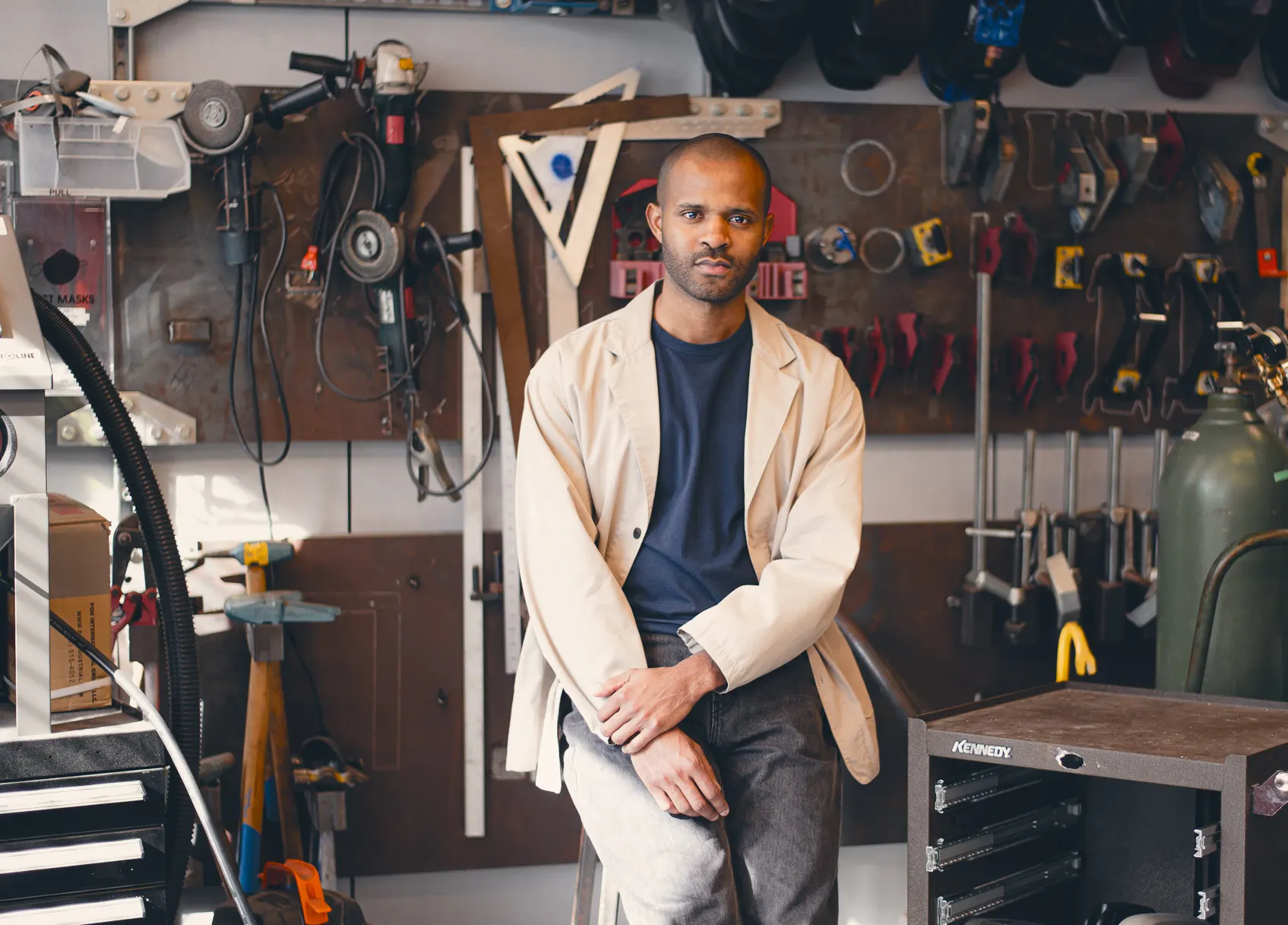Dexter Callender III
2024 Harold and Arlene Schnitzer Prize in the Visual Arts
More about the artist
Light Sculptures, Matters of Impermanence
August 2023 – Present
Materials: Glass, Photography, Code
Supported by the Council for the Arts at MIT
Light Sculptures, Matters of Impermanence are a series of artworks that transform the movement of natural light within architecture into sculptural forms. Callender employs a combination of technology and traditional craftsmanship, using code and computer vision to trace sunlight’s journey across space before shaping it into glass sculptures by hand. Each piece serves as a physical snapshot of time, compressing hours of light movement into a single physical object. Beyond visual artifacts, the sculptures are also reflections of his personal experiences with light.
Callender started this art series by focusing on four prominent architectural landmarks in the Boston/Cambridge area: the MIT Media Lab, Carpenter Center for Visual Arts, Gropius House, and Isabella Stewart Gardner Museum. While reflecting on his personal experience with light in these buildings, he also engages with the location’s architectural history.
2024 Schnitzer Prize in the Visual Arts recipient Dexter Callendar III’s Light Sculptures, Matters of Impermanence. Courtesy of the artist.
2024 Schnitzer Prize in the Visual Arts recipient Dexter Callendar III’s Light Sculptures, Matters of Impermanence. Courtesy of the artist.
2024 Schnitzer Prize in the Visual Arts recipient Dexter Callendar III’s Light Sculptures, Matters of Impermanence. Courtesy of the artist.
2024 Schnitzer Prize in the Visual Arts recipient Dexter Callendar III’s Light Sculptures, Matters of Impermanence. Courtesy of the artist.
2024 Schnitzer Prize in the Visual Arts recipient Dexter Callendar III’s Light Sculptures, Matters of Impermanence. Courtesy of the artist.
2024 Schnitzer Prize in the Visual Arts recipient Dexter Callendar III’s Light Sculptures, Matters of Impermanence. Courtesy of the artist.
2024 Schnitzer Prize in the Visual Arts recipient Dexter Callendar III’s Light Sculptures, Matters of Impermanence. Courtesy of the artist.
Cloud Lights
December 2022 – Present
Materials: Mixed media (white oak plywood, frosted acrylic, copper vinyl, steel rods, diodes).
Artechouse, Miami FL
Cloud Lights are a series of light sculptures inspired by clouds diffusing the setting sunlight. Capturing the interplay of light and shadow, Callender’s work marries the randomness of nature with the exactness of coding. The sculptures are crafted from a blend of natural woods and complemented by frosted acrylic, copper tape, and aluminum rods. Callender also develops custom software tools which he uses to explore sculptural variations as a means of ideation in his creative process. Three of these sculptures were exhibited in Miami during Miami Art Week at Artechouse.
2024 Schnitzer Prize in the Visual Arts recipient Dexter Callendar III’s Cloud Lights. Credit: Artechouse.
2024 Schnitzer Prize in the Visual Arts recipient Dexter Callendar III’s Cloud Lights. Courtesy of the artist.
2024 Schnitzer Prize in the Visual Arts recipient Dexter Callendar III’s Cloud Lights. Courtesy of the artist.
2024 Schnitzer Prize in the Visual Arts recipient Dexter Callendar III’s Cloud Lights. Courtesy of the artist.
2024 Schnitzer Prize in the Visual Arts recipient Dexter Callendar III’s Cloud Lights. Courtesy of the artist.
Intersync
November 2023 – Present
MIT Department of Urban Studies and Planning (DUSP), Cambridge MA. The Lilypad Inman Square, Cambridge MA. Piano Craft Gallery, Boston MA.
As a trained jazz musician, Dexter Callender III performs in the band Intersync alongside Rafael Heredia and Arman Wali, two musicians from Berklee College of Music. Sonically, Intersync merges lush electronic sounds with the history of jazz music and the space and feeling of ambient music.
They’ve played shows on MIT’s campus and across the Boston and Cambridge area. They take attention to their set design, often incorporating light in explicit and implicit aspects of the performance.
Dexter Callender III – tenor saxophone, electronics
Arman Wali – keyboard, rubab
Rafael Heredia – drums, guitar, cajón, auxiliary percussion
Learn more about the project
2024 Schnitzer Prize in the Visual Arts recipient Dexter Callendar III performs with Intersync. Courtesy of the artist.
2024 Schnitzer Prize in the Visual Arts recipient Dexter Callendar III performs with Intersync. Credit: Astha Zylah.
2024 Schnitzer Prize in the Visual Arts recipient Dexter Callendar III performs with Intersync. Credit: Luis Edgardo Cotto.
Light Clock
December 2022
Materials: White Ash Plywood, Raw Unfinished Steel, PLA, Copper, Custom Electronics
Light Clock is a timepiece that tells time using light. A light source orbits around a circular clock face, casting a ray of light towards a mirror at its center. The incident ray is the hour hand and the reflected ray is the minute hand. Callender sought to use light as a primary material in the design of this functional object, and created this object as a simple and elegant study of reflection.
2024 Schnitzer Prize in the Visual Arts recipient Dexter Callendar III’s Light Clock. Courtesy of the artist.
2024 Schnitzer Prize in the Visual Arts recipient Dexter Callendar III’s Light Clock. Courtesy of the artist.
2024 Schnitzer Prize in the Visual Arts recipient Dexter Callendar III’s Light Clock. Courtesy of the artist.
2024 Schnitzer Prize in the Visual Arts recipient Dexter Callendar III’s Light Clock. Courtesy of the artist.
2024 Schnitzer Prize in the Visual Arts recipient Dexter Callendar III’s Light Clock. Courtesy of the artist.
About the Artist
Dexter Callender III is an artist and computational designer. He uses code to express his ideas as artifacts, which speak to the aspects of his experience he finds most beautiful. Oftentimes these artifacts take shape as physical objects, and other times as sounds, videos, and images. Irrespective of the medium, he aims to create work that is purposeful and authentic to the intuitions that compel him through his creative process. He writes code, creates objects and media, and makes music, seeking resonance across distinct modes of expression.
More at Dexter Callender III’s website
Social: Instagram
Back to 2024 Schnitzer Prize in the Visual Arts


